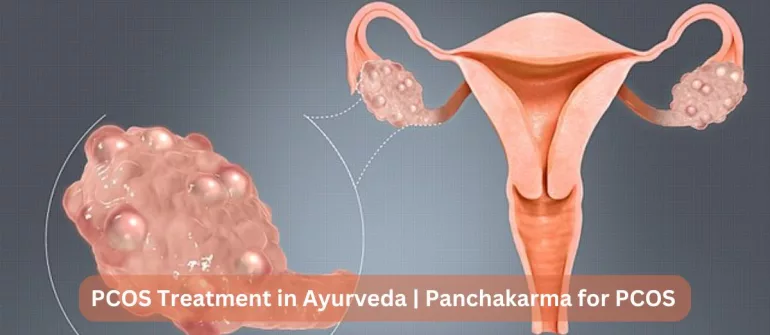Polycystic Ovary Syndrome (PCOS), a hormonal disorder affecting individuals with ovaries during their reproductive years, finds comprehensive treatment in Ayurveda. This ancient science addresses PCOS through a three-pronged approach: balancing the doshas, Panchakarma therapy, and personalized diet and lifestyle modifications.
Understanding PCOS
PCOS is a prevalent endocrine disorder among individuals assigned female at birth, characterized by symptoms such as:
- Irregular menstrual cycles
- Elevated androgen (male hormone) levels
- Immature follicles on the ovaries (misleadingly termed “cysts”)
The Causes and Diagnosis of PCOS
While the exact cause of PCOS remains unclear, research suggests a combination of genetic and environmental factors. Key contributors include hormonal imbalances, particularly:
- Elevated androgen levels
- Insulin resistance
Diagnosis involves a comprehensive assessment of symptoms, hormonal levels, and medical history.
we’ll explore the most effective treatments for PCOS and how Dr. Sri Ranjani Bhat can help you find the right therapies for your specific needs.
Ayurvedic Understanding of PCOS Treatment
Ayurvedic Perspective on Polycystic Ovary Syndrome (PCOS)
Ayurveda, India’s ancient system of medicine, views PCOS as a condition arising from imbalances in the body’s energies, or doshas. According to Ayurveda, health is a state of balance among the three doshas: Vata, Pitta, and Kapha.
Key Imbalances Contributing to PCOS
- Dosha Imbalance: PCOS is linked to Kapha and Vata dosha imbalances.
- Kapha imbalance: Excessive accumulation, heaviness, and sluggishness.
- Vata imbalance: Irregularities, erratic menstrual cycles, and hormonal fluctuations.
- Agni Impairment: Weakened digestive fire (Agni) leads to toxin formation (ama) and hormonal disruption, contributing to insulin resistance and metabolic issues.
- Ama Accumulation: Undigested toxins clog body channels, including the reproductive system, disrupting ovarian function.
- Dhatu Imbalance: Imbalances in:
- Rasa dhatu (plasma): Affects menstrual fluid quality.
- Meda dhatu (fat tissue): Leads to excess weight gain.
- Ojas Depletion: Chronic stress, poor diet, and lifestyle factors deplete ojas, impacting immunity, vitality, and reproductive health.
Ayurvedic Treatment Approach
To address PCOS, Ayurvedic treatment focuses on:
- Balancing Kapha and Vata doshas
- Strengthening Agni (digestive fire)
- Eliminating Ama (toxins)
- Nourishing Dhatus (body tissues)
- Replenishing Ojas (vitality and immunity)
By understanding the underlying imbalances, Ayurveda offers a comprehensive and holistic approach to managing PCOS.
Some Problems Women Faced in Daily Life Due to PCOS
Polycystic Ovary Syndrome (PCOS) affects millions of women worldwide, presenting a range of physical and emotional symptoms that impact daily life. Here are some common challenges women with PCOS face:
Physical Symptoms
- Irregular Periods: Unpredictable and missed periods.
- Weight Gain: Difficulty maintaining a healthy weight.
- Acne and Oily Skin: Hormonal imbalances causing skin issues.
- Excess Facial and Body Hair: Unwanted hair growth.
- Hair Thinning: Scalp hair loss.
- Bloating and Digestive Issues: Frequent digestive problems.
Emotional and Mental Health Impacts
- Fatigue: Persistent tiredness and low energy.
- Mood Swings: Irritability, anxiety, and emotional fluctuations.
- Low Self-Esteem: Physical changes affecting confidence.
- Fertility Concerns: Difficulty conceiving naturally.
Metabolic Challenges
- Cravings and Hunger: Insulin resistance leading to intense sugar cravings.
- Weight Management: Struggling to maintain a healthy weight.
Managing PCOS
While these challenges can be overwhelming, adopting a balanced lifestyle can significantly improve physical and emotional well-being. Effective management strategies include:
- Healthy eating habits
- Regular exercise
- Stress management
- Medical treatment and guidance
- Emotional support networks
By acknowledging these common challenges, women with PCOS can better navigate their daily lives, seek support, and prioritize their overall health.
Ayursh Ayurveda Approach to Treat PCOS
At Ayursh Ayurveda we are following a holistic approach that aims to balance doshas, address underlying imbalances, and promote overall well-being. It involves a combination of dietary changes, lifestyle modifications, herbal remedies, and potentially Panchakarma therapies. Here’s an overview of Ayurvedic treatment for PCOS that we are following at Ayursh Ayurveda.
1. Diagnosis and Assessment:
At Ayursh Ayurveda our expert doctor assesses your individual constitution (Prakriti) and current imbalances (Vikriti) to create a personalized treatment plan. This assessment involves understanding your physical, mental, and emotional state.
2. Dietary Modifications:
- At Ayursh Ayurveda we Emphasize warm, cooked, and easily digestible foods.
- Include a variety of whole grains, fresh vegetables, and fruits.
- Choose lean proteins and healthy fats while reducing refined carbohydrates and sugars.
- Incorporate Ayurvedic spices to aid digestion and balance doshas.
3. Lifestyle Modifications:
- At Ayursh Ayurveda we recommend establishing a daily routine that includes regular wake and sleep times.
- Engage in regular, moderate exercise that suits your body type.
- Practice stress-reduction techniques like yoga, meditation, and deep breathing.
- Prioritize quality sleep and create a calming bedtime routine.
4. Herbal Remedies:
At Ayursh Ayurveda we recommend taking Ayurvedic herbs like Shatavari, Ashwagandha, Guduchi, etc based on dosha to support hormonal balance, digestion, and overall well-being.Herbal formulations are tailored to your unique constitution and imbalances.
5. Panchakarma Therapies:
Panchakarma, a series of detoxification and rejuvenation therapies, can help remove toxins, balance doshas, and support the body’s natural healing processes.
Therapies might include oil Panchakarma Vamana, Virechana, Basti, some massages, herbal steam bath,s and many more.
6. Stress Management:
At Ayursh Ayurveda we focus on Stress reduction to treat PCOS, as stress can exacerbate hormonal imbalances.
Techniques like meditation, mindfulness, and relaxation exercises, Shirodhara, takradhara are beneficial.
7. Follow-Up and Monitoring:
We at Ayursh Ayurveda recommend Regular follow-up visits with our expert Ayurveda doctor to assess progress, adjust treatments, and address any changes in symptoms.
8. Individualized Approach:
Ayursh Ayurveda recognizes that each person’s condition is unique, and treatment plans are personalized to address your specific needs.
The treatment approach may evolve over time as your body responds to interventions.
Why Ayursh Ayurveda is the Best Ayurvedic Clinic in Bangalore for PCOS Treatment in Ayurveda?
Ayursh Ayurveda stands as the premier Ayurvedic clinic in Bangalore for PCOS Treatment in Ayurveda, drawing on an illustrious 24-year legacy of providing exceptional healthcare. Our extensive experience, combined with our deep-rooted expertise in Ayurveda, positions us at the forefront of holistic PCOS treatment. Our Clinic Ayursh Ayurveda operates four state-of-the-art clinics across Bangalore, each equipped to offer personalized and comprehensive care.
Ayurvedic Herbs for PCOS Treatment in Ayurveda
In Ayurveda, herbal remedies are often used to support the management of Polycystic Ovary Syndrome (PCOS) by addressing dosha imbalances, hormonal regulation, metabolism, and overall well-being. It’s important to note that individual responses to herbs can vary, and consulting with a qualified Ayurvedic practitioner is recommended before incorporating any herbal remedies into your routine. Here are some commonly used Ayurvedic herbs for PCOS:
- Shatavari: Shatavari is renowned for its hormonal balancing properties and is often used to support reproductive health in women. It can help regulate menstrual cycles, alleviate hormonal imbalances, and nourish the reproductive system.
- Ashwagandha: Ashwagandha is an adaptogenic herb that helps manage stress and cortisol levels, which can be beneficial for women with PCOS. It also supports hormonal balance and may improve insulin sensitivity.
- Guduchi: Guduchi is known for its immune-boosting properties and can help detoxify the body by eliminating toxins (ama). It supports healthy metabolism and digestion, which are important aspects of PCOS management.
- Triphala: Triphala is a combination of three fruits—amla, haritaki, and bibhitaki—that is commonly used to improve digestion, promote detoxification, and regulate bowel movements. Proper digestion and elimination are essential for managing PCOS.
- Fenugreek: Fenugreek seeds are believed to help improve insulin sensitivity and regulate blood sugar levels. This can be beneficial for managing insulin resistance commonly seen in PCOS.
- Cinnamon: Cinnamon has been shown to have the potential to improve insulin sensitivity and regulate menstrual cycles. It can be included in your diet or taken as a supplement.
- Licorice: Licorice root can support adrenal health and help balance hormones. However, it’s important to use licorice cautiously and under the guidance of a practitioner, as excessive use can lead to potassium imbalances.
- Turmeric: Turmeric possesses anti-inflammatory and antioxidant properties. It may help reduce inflammation associated with PCOS and support overall well-being.
- Aloe Vera: Aloe vera is used to support digestion and detoxification. It can help in reducing inflammation and supporting the removal of toxins from the body.
- Guggul: Guggul is believed to help regulate lipid metabolism and may support weight management in individuals with PCOS.
Role of Panchakarma Treatment for PCOS
Panchakarma is a comprehensive Ayurvedic detoxification and rejuvenation therapy that involves a series of cleansing treatments designed to balance the doshas, eliminate toxins (ama), and restore overall health. While Panchakarma may not directly “cure” Polycystic Ovary Syndrome (PCOS), it can play a significant role in managing the condition by addressing underlying imbalances and promoting overall well-being. Here’s how Panchakarma treatment can benefit individuals with PCOS:
- Panchakarma therapies are designed to remove accumulated toxins from the body. For individuals with PCOS, detoxification can help eliminate ama that might be clogging the channels of the body, including the reproductive system. Removing toxins can aid in restoring hormonal balance and supporting the proper functioning of the ovaries.
- Doshas: PCOS is often associated with imbalances in the doshas, particularly Kapha and Vata. Panchakarma therapies work to bring these doshas back into equilibrium, which can help regulate hormonal activity, improve digestion, and enhance metabolic functions.
- Digestion: Many Panchakarma treatments, such as Abhyanga (oil massage) and Swedana (steam therapy), help improve digestion and increase agni (digestive fire). Proper digestion is crucial for managing PCOS symptoms, as efficient digestion supports the proper metabolism of nutrients and hormones.
- Stress Reduction: Panchakarma includes relaxation techniques like meditation and Shirodhara (pouring warm oil on the forehead). These practices help reduce stress, which is beneficial for managing hormonal imbalances often associated with PCOS.
- Supporting Reproductive Health: Panchakarma can help rejuvenate and nourish the reproductive system. This can improve the quality of menstrual cycles, balance hormones, and potentially support fertility.
- Weight Management: Some Panchakarma treatments, combined with proper dietary guidance, can aid in weight management. Excess weight and insulin resistance are common concerns in PCOS, and addressing these factors can positively impact overall health.
- Individualized Approach: Panchakarma is tailored to the individual’s constitution (Prakriti) and current imbalances (Vikriti). This personalized approach ensures that the treatments are suited to your specific needs, addressing both the symptoms and underlying factors of PCOS.
Diet and lifestyle modification for PCOS Treatment in Ayurveda
Diet and lifestyle modifications play a crucial role in managing Polycystic Ovary Syndrome (PCOS) from an Ayurvedic perspective. These changes aim to balance doshas, improve digestion, support hormonal regulation, and enhance overall well-being. Remember, it’s important to consult with an Ayurvedic practitioner to create a personalized plan that suits your constitution and imbalances. Here are some general guidelines:
Diet Modifications for PCOS
- Balancing Doshas: Focus on foods that balance Kapha and Vata doshas. This involves favoring warm, light, and easily digestible foods.
- Whole Grains: Choose whole grains like quinoa, brown rice, millet, and barley. Avoid refined carbohydrates and sugary foods that can affect blood sugar levels.
- Incorporate Healthy Fats: Consume moderate amounts of healthy fats from sources like ghee (clarified butter), coconut oil, and olive oil. Avoid trans fats and excessive saturated fats.
- Choose Lean Proteins: Include lean protein sources such as lentils, beans, chickpeas, and lean meats like turkey or chicken. Protein helps stabilize blood sugar levels and supports tissue repair.
- Emphasize Fiber: Include plenty of fiber-rich vegetables, fruits, and whole grains to support digestion, regulate blood sugar, and promote gut health.
- Spices and Herbs: Incorporate Ayurvedic spices like turmeric, cumin, coriander, and fenugreek. These spices can help balance doshas and aid digestion.
- Stay Hydrated: Drink warm herbal teas and room-temperature water to support digestion and hydration. Avoid excessive cold beverages.
Lifestyle Modifications of PCOS Treatment in Ayurveda
- Regular Routine: Establish a regular daily routine, including waking up and going to bed at consistent times. This helps balance Vata dosha and supports hormonal regulation.
- Exercise: Engage in regular, moderate exercise that suits your body type and current condition. Exercise helps improve insulin sensitivity, manage weight, and reduce stress.
- Stress Management: Practice stress-reduction techniques like yoga, meditation, and deep breathing. Chronic stress can exacerbate hormonal imbalances in PCOS.
- Quality Sleep: Ensure you get sufficient, restful sleep each night. Aim for 7-9 hours of sleep to support hormonal balance and overall well-being.
- Mindful Eating: Eat mindfully, paying attention to hunger and fullness cues. Avoid overeating and emotional eating.
- Avoid Toxins: Minimize exposure to environmental toxins by choosing organic and natural products whenever possible.
- Limit Stimulants: Reduce or eliminate caffeine and alcohol, as they can disrupt hormone balance and stress the body.
- Social Connections: Maintain strong social connections and engage in activities that bring joy and relaxation.



